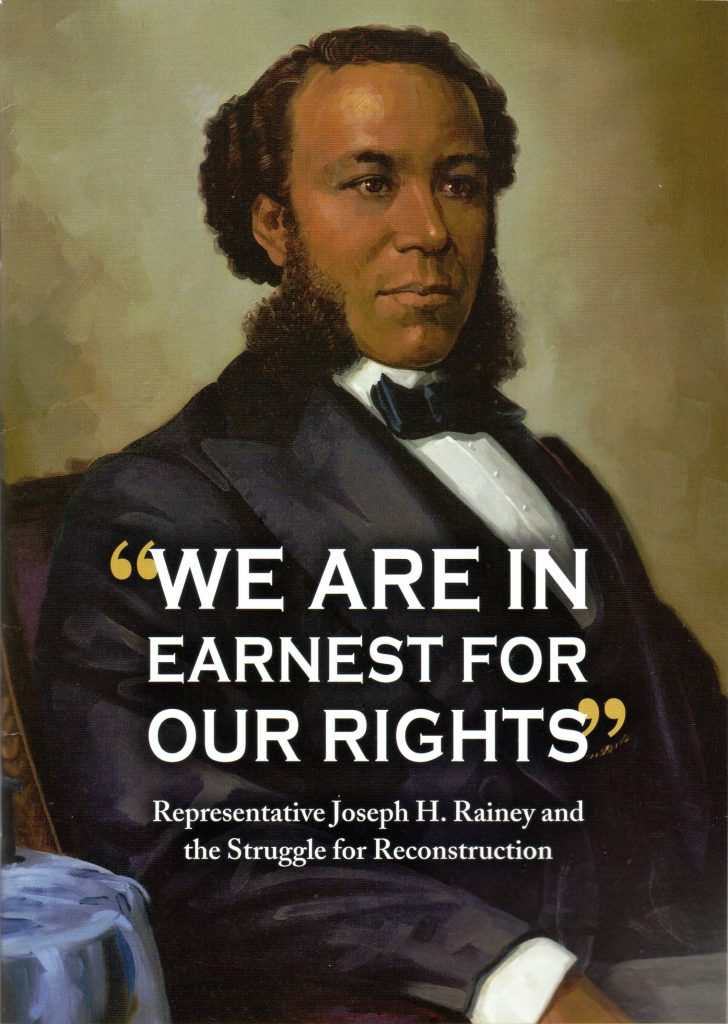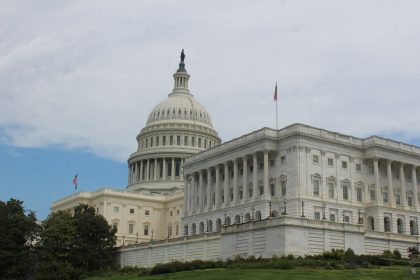If You Like Political History, Being House Historian Can’t Be Beat

WASHINGTON – It happens like clockwork, every two years.
Whenever one Congress ends and another is about to begin, House Historian Matthew Wasniewski and his staff of nine know the next several weeks will be busy indeed.
Not only do they do what Wasniewski described as a “tremendous” amount of updates to the House history website, but there are always scores of new entries to make to the Biographical Directory of Congress, a directory that goes back to 1860.
And then, with the transition, come the hours of conversations with new members and their staff, explaining the history of the House and how it has developed over time.
All this transpires, mind you, with the office phone ringing and emails arriving from members of the general public itching to find an answer to a question they could not unearth anywhere else.
It all makes for a very busy fall and holiday season, and Wasniewski wouldn’t have it any other way.
“We are here for the Members and the staff. We’re here for the institution, but I like to think of us as a public history office, here for anyone who wants to call in or email or write to learn about the House,” he told The Well News last week.
“If you like political history, being the House historian is a front row seat, and that’s definitely been my interest from a pretty early age,” he added.
Inspired by Washington Post Sportswriter
Wasniewski readily admits his was a “nonlinear journey” to the House historian’s office. Growing up, he said, he wanted to be the next Tom Boswell, a sports writer, and enrolled in college intent on making that his career.
“I was a journalism major, but along the way, while I was doing a lot of writing for the student newspaper, I picked up history as a second major,” he said.
It was a natural outgrowth of growing up in Northern Virginia, and being taken by his parents to all the regional historic sites.
Though he did ultimately land a job as the sports editor for a small newspaper in Fauquier County, a rural exurb of Washington, D.C., it wasn’t long before the tug of history grew irresistible.
“I was with the newspaper for about a year-and-a-half, two years, and I began to think, I like journalism, but I really like writing history even more and being able to research something and dig into it,” he said.
With that, Wasniewski decided to go back to school, enrolling at James Madison University in Harrisonburg, Va., to get a Master’s Degree in history, and then going on to the University of Maryland, College Park, where he secured his Ph.D.
It wasn’t long after his arrival in College Park that the National Archives opened a branch on the university campus.
“For somebody who was interested in political history and 20th century foreign policy, which I was, it was perfect,” he said. “All the records were right there.”
At the time, Wasniewski believed he was going to teach, “because that’s kind of the route you’re on when you get a Ph.D.”
But the more he delved into his studies, the more people he met who were doing “public history,” working for the Smithsonian or non-profits devoted to history, or working elsewhere as curators and archivists.
“There was this whole network of people I hadn’t realized existed, and on top of that, these were really cool jobs where you not only got to write for academics, but you also get to deal with the public and do all different kinds of history, not just writing and research,” he said.
This discovery changed the path Wasniewski had been on. Upon graduation, he got a job at the U.S. Capitol Historical Society, a private non-profit. Four years later, in 2002, he moved a short distance on Capitol Hill to the House Clerk’s office.
History Not Always A Permanent Fixture In The House
Though history is the constant byproduct of what occurs in Congress, tracking and preserving that history was long left to somebody else.
The Senate created its Historian’s office in 1976, at the urging of historian Arthur Schlesinger, Jr.
It was Schlesinger who approached then- Senate Majority Leader Mike Mansfield, D-Mont., and Minority Leader Hugh Scott, R-Pa., in the wake of Watergate and noted that while Congress had been paying a lot of attention to the papers of the president, it was doing little to nothing about its own historical records.

“Schlesinger’s intervention led not only to the creation of the history office, but also a better approach to capturing and maintaining Senate records,” Wasniewski said.
The House didn’t exactly rush to follow suit. Though the chamber did establish its own history office in the 1980s, it was not really a permanent fixture.
“It kind of came in and went away,” is how Wasniewski described the situation.
In fact, it wasn’t until the early 2000s that the House decided to establish a history, art and archives department under the office of its clerk.
At the same time, the House committed to hiring a curator to take care of its art and artifacts, and an archivist to take care of the official records.
“All three of us came on board at the same time, and that’s how I started here,” said Wasniewski, who was named historical editor.
In that role, he managed House publications like the Biographical Directory of Congress and a series of books on women, African Americans, Hispanic Americans, and Asian and Pacific Islander Americans who had been or were Members of Congress.
Despite these moves, there were still some holes in the House history operation, the main one being a long-standing vacancy in the historian post working under the auspices of the Speaker’s office.
In 2005, then-House Speaker Dennis Hastert hired Robert Remini, the great biographer of Andrew Jackson and Henry Clay, among others, and officially named him “Historian of the U.S. House.”
When Remini retired after five years on the job, a national search committee chose Wasniewski to take his place and the history functions of the House were merged into one office.
“I still work closely with the clerk’s office, and our old colleagues in the curatorial and archives departments, but we are separate offices,” Wasniewski said.
A Different Kind of Job
The House historian’s office is staffed by individuals who all have extensive backgrounds in history, political science and/or library studies. Currently four members of the team hold Ph.Ds, while another member is working on theirs, and everyone else holds at least a Master’s Degree.
So what kinds of things do Members and House staffers turn to the historians for that they wouldn’t seek from the House parliamentarian or somebody else?
“That’s a great question,” Wasniewski said. “We don’t do process questions. That’s definitely in the wheelhouse of the parliamentarians. And we don’t do policy questions, as that is what the Congressional Research Service and the Library of Congress are for … But anything related to institutional development over time comes to us … and it is such a range.
“For instance, right now we’re doing a mailing of a booklet we just published on the first African-American Member to serve in the House, because the 150th anniversary of his arrival is coming up in December,” he said. “His name was Joseph Rainey and he was from South Carolina.
“So, literally, you could have someone ask, ‘Who was the first African-American member of the House?’ Or ‘When was the last time the Constitution was read on the floor of the House?’ Or ‘Who was the first Speaker?’ ‘How many speakers have come from Massachusetts?’
“A Member might ask, ‘What’s the history of my office in the Cannon Building?’ Or say, ‘I understand John Kennedy had my office, is that true?’
“Another questions might be ‘How has the Office of the Speaker changed over time?'” Wasniewski said. “So, the questions can range from the very broad to the very specific, but the one common element is that many deal with change over time and that really animates the history of an institution.”
Though it played no role in the House of Representatives adopting new rules earlier this year to allow for proxy votes and remote participation by members in hearings and other matters, the House historian’s office did field a number of Member inquiries on past pandemics.
“A lot of members wanted to know how the House handled past pandemics, when and for how long the gallery was closed, the impact of proceedings … and as it happened, we had published a blog on our website, in 2018, on the span of time Congress was out during the 1918 influenza epidemic,” Wasniewski said.
“The situation in 1918 was actually pretty unique because the District of Columbia was hit pretty hard by the outbreak in October 1918, and the House closed the Capitol galleries to everyone but Members and the very small staffs they had at the time,” he continued.
“Interestingly enough, given how much we are talking about rules and procedures these days, the House actually debated and passed a bill related to the public health service without a quorum present in 1918,” he said. “And no one objected.”
“But that’s really the only question we’ve gotten about the pandemic — what was the impact on operations. Again, the change in rules and procedures this year, that was entirely a question for the parliamentarian.”
When It Comes to History, Capitol Has Many Jurisdictions
Anyone who has spent any time in the Capitol, of course, knows that in addition to its government functions, it is also one of the nation’s great repositories of paintings and sculpture.
Interestingly, the House historian has only a tangential role in their preservation — consulting on publications about the collection.
“There are actually three entities that oversee the art,” Wasniewski said. “On the House side we have a House curator and she and her staff handle all the art and artifacts on the House side — everything from the paintings on the wall, the Speakers portraits and things of that nature to campaign buttons and memorabilia and old gavels.
“Similarly, the Senate has its own curatorial staff, and predating either of those offices, is the curator of the Architect of the Capitol who is in charge, among others things, of the statutes in Statuary Hall, the paintings in the rotunda, the Brumidi corridors, and the larger collection that’s more tied to the physical structure of the building,” he said.
What Wasniewski said next is likely to give pause to anyone who has ever considered writing an in-depth history of some facet of Congress or another — congressional records are here, there and seemingly everywhere.
“There’s a caveat to that, of course,” Wasniewski said. “The House has an archivist who works under the clerk and the clerk is the chief records keeper for the House — a role that goes all the way back to the beginning, in 1789. So the clerk’s office is always overseeing the records of the House.
“The thing is, records are defined in a lot of different ways,” he continued. “Official records are things like documents generated by a committee or the records of some of the officers of the House and the support staff.
“The House archivist oversees the retention of those records and those are transferred to the National Archives,” Wasniewski said.
“They oversee the retention of those records, and they’re transferred to the National Archives. There is actually a building downtown called the Center for Legislative Archives, and that’s where all the congressional records go.
“Building on a theme we established earlier, the Senate has its own archivist who retires the official records of the Senate, and again those are largely committee records and the like,” he said.
Personal papers of individual Members however, are another matter. Those are the private property of the Members themselves, and where they ultimately end up is a personal matter — usually the Member’s alma mater or other educational entity.
“What the archivist does, in cases where a Member is leaving or retiring, is make themselves available to consult on best practices for the preservation of records, advising on what they should keep and the process for donating them to a college or university.”
It sounded, it was suggested, like a historian looking to write a book on a single act of Congress could end up having to visit a half dozen or more locations.
“But remember, before we had a National Archives, we didn’t have a good system for retiring records,” Wasniewski said.
“There’s been this process, this orderly process of retiring them, since shortly before World War II, and this is true of federal records generally,” he said.
“But to your point, if you were looking to tell the story of the 1964 Civil Rights Bill, to cite an example, you’re going to want to look at the Judiciary Committee records on the House side, which means you’re going to go to the Center for Legislative Archives.
“The same is true of the Rules Committee records, because the Rules Committee has a key role in important legislation. And then you’d want to do the same for the Senate records. But beyond that, there’s a whole other level of research you might want to do,” Wasniewski said.
“For instance, I would want to look at the personal papers of Emmanuel Celler, who was chairman of the Judiciary Committee during that period,” he said. “And then I’d want to look at the papers of William McCulloch, who was the ranking Republican on the committee and see what his papers say … and like I said, those things aren’t here.
“So yes, congressional research can be challenging, because to do it thoroughly, you’re going to be looking at a number of different archives to kind of get the full picture,” Wasniewski said.
Making History Live
In a round-about way, this brought the conversation back to Congressional transitions.
“I think for new Members, for their staff and members of the general public, when they think about Congress, they see it as this monolithic institution,” Wasniewski said. “I mean, it just seems so big and has had so many Members over the years, that it’s very hard to come to terms with how it operates.
“So when we have a transition and inevitably have new members coming in, we give history talks to explain how the institution has developed over time and to acquaint them with some of the more unique members down through history. It’s a way to try to help people get a toehold in this new, very special, environment,” he said.
Wasniewski said though new House Members and members of their staff come from a range of backgrounds, more often than not, they are already fans of history.
“So there’s an interest there. Some background of reading on the subject, and our job, in part, is to continue to try to cultivate that interest,” he said.
“Sometimes, it’s a little story about a person, that sparks a deeper interest, a biographical snippet or the background on an event that helps humanize the larger story a little bit, and that helps bring the institution into focus by giving people something to connect with,” Wasniewski added.
“Our job, in a sense, is to put a human face on what might otherwise seem like a rather remote and imposing institution,” he continued. “We also point out that what we think of as one Congress, is really two completely different institutions.
“The House and Senate exist on paper as a single Congress, but in practice they are really two entirely different institutions, operating under different rules of procedure, different traditions, different assumptions,” he said.
Wasniewski said one transition activity that’s been curtailed this year due to the pandemic is the recording of oral histories with Members and long-serving members of their staffs.
“This is something we do regularly, but we tend to get much busier with it during transitions, during normal times,” he said. “This year, due to COVID, we’re not doing it because we simply haven’t figured out a way to do it.
“To date we’ve collected north of 350 oral histories and these are invaluable to people interested in history because you’re hearing the stories of people who might not necessarily be in front of a microphone or camera a lot.
“We’ve got everyone from Members to House leadership to pages, from back in the day when the House had pages, and most recently, for the centennial of the first woman in Congress, we did a project focusing on former women members and former women staff. That collection alone includes roughly 50 interviews and a lot of these oral histories are online.
“So that’s another thing we do when we move from one Congress to another. When that happens we have a lot of Members retiring and we reach out to those folks who have got a lot of institutional knowledge and try to get their memories.
“If you like political history, there’s almost nothing better than that,” Wasniewski said.
























